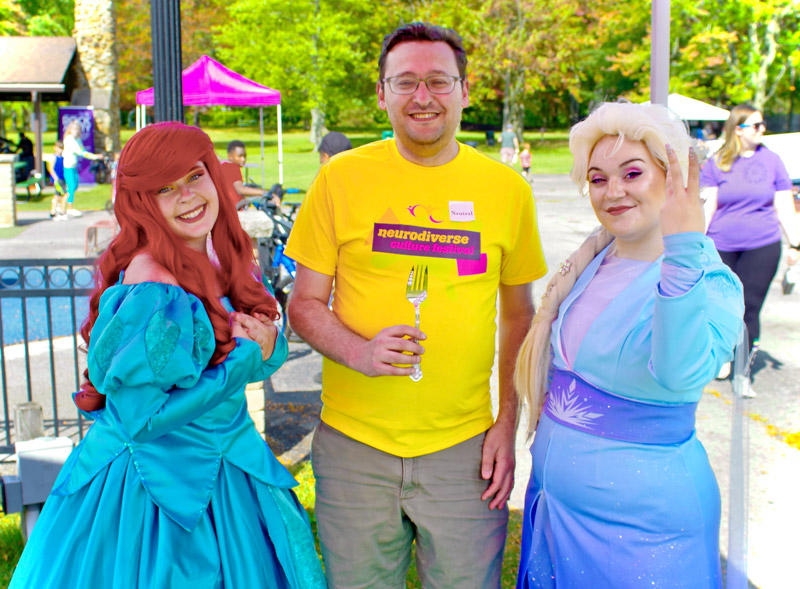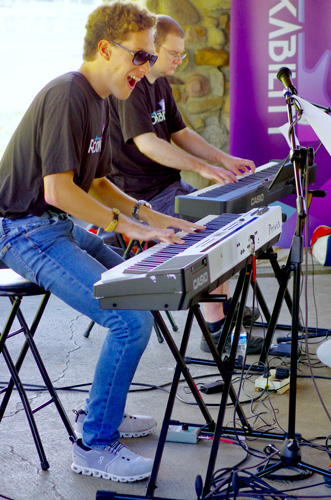Almost 11 years ago, I founded an organization, Autism Personal Coach, that provides coaching to autistic adults and teens to improve the quality of our lives. Within the first year of our existence, I realized that the lack of community was a glaring and alarming need for many of our clients. That is when we decided, in addition to our 1:1 coaching, to have monthly events for autistics to access this community. We have had monthly dinners, attended sporting events, visited places based on our clients’ passions, such as aquariums and zoos, and volunteered in our local area. While these events were beneficial to some of the autistic people who attended, for others, these events probably weren’t helpful.

Doug Blecher, Neurodiverse Culture Festival Event Organizer, with the Wandering Royals, a company that brings princesses to your event or party
I knew something wasn’t quite right during those first few years of events, but I couldn’t figure out what was missing. It wasn’t until I learned that I was autistic a couple of years ago that it finally occurred to me. The thing that is lacking in community inclusion for autistic and all neurodivergent people is that we are an afterthought or, often, not a thought at all in the development of community events. There isn’t much thought given to our different communication and sensory needs or how events in the community can truly be accessible to the 1 in 4 people in our population who are neurodivergent. The result of this lack of thought and planning often leads to overwhelm at these events in autistic people, including myself, even when we are doing things we love.
That is when I decided I wanted to create something that would put our needs as autistic and neurodivergent people at the forefront of planning so we can access that joy in our local community. I have always enjoyed festivals, but at the same time, they are incredibly overwhelming. I thought, what if I could create an inclusive festival that was accessible to all people? However, I clearly couldn’t do this alone, so I reached out to trusted community partners, and we created the Neurodiverse Culture Festival that happened this past September.
In the autistic community, there is a popular slogan, “Nothing about us, without us,” which was precisely the approach we took regarding the Neurodiverse Culture Festival. We wanted to make sure that the needs of neurodivergent people were identified, so we communicated with approximately 30 neurodivergent people in our community in planning the inclusive festival regarding what would make it accessible to them, along with what types of activities they would want to be there.
Based on that information, these are some of the accessibility features that were included in the festival:
Accommodate Different Communication Needs
Many neurodivergent people have experienced the anxiety that comes from going out into the community, where anyone can talk to us at any time. This anxiety is a result of not knowing expectations or of past negative experiences in communicating with people you might not know. To reduce this barrier, the Neurodiverse Culture Festival created a set of interchangeable communication stickers to specify communication preferences. In addition to these stickers, we also had ASL and Spanish language interpreters by request for anyone who needed one.
Accommodate Different Sensory Needs
I am grateful when there is a sensory space at an event. It means at least some thought is given to accommodate those with different sensory needs. However, one space can’t accommodate the different needs of all people who may attend an event. That was why we created different types of sensory spaces at the inclusive festival. We worked with a local county board that had a mobile sensory van at the event. Some people need lots of movement to reduce their sensory overwhelm, so we also had a self-guided sensory loop so people could get that type of input. Some of us needed an extended distraction to get our minds off the overwhelm we were dealing with, so we had an art space with activities that people could engage in at the festival. We further understand that one of the most overwhelming parts of a festival is that the activities and spaces can be so crowded. We made a concerted effort to spread out the activities at our inclusive festival to reduce this likelihood.
Adult Changing Station

Rockability, an all-neurodivergent rock band
performing at this year’s festival
The inclusive festival took place here in Ohio, and 4% of Ohioans can’t access public restrooms due to there not being a height-adjustable changing table in these spaces for their continence care. That is undoubtedly a huge barrier to accessing festivals and other community events. We worked with a local county board of developmental disabilities that provided a portable and accessible changing table so those who needed this support could access it at the Neurodiverse Culture Festival.
When you meet one autistic person, you have met one autistic person. However, we have a lot in common, and for the festival, we tried to include some of the things we love at the event. This included a drag show performance, a rock band, and a musical. These performances were composed almost exclusively of neurodivergent people. As a community, we also love animals, so we brought in a guide dog and an owl. We also had discussions on medical marijuana, a simulated forest habitat inside a 38-foot vehicle, an opportunity to view your DNA, a drum circle, and much more.
I didn’t know what to expect. Would anyone show up? Would we get sponsors to cover the cost of the event? Would people enjoy the experience and feel like this was a safe, accessible, and inclusive environment? However, by any measure, this event was a massive success. This has spurred us on to bring the Neurodiverse Festival back in 2024. We will take the lessons we learned from this event and make next year’s inclusive festival even better.
The most important thing that came out of the Neurodiverse Culture Festival is that this was evidence that we, as neurodivergent people, can imagine and create a world we want to live in. Any event can do the same if it prioritizes accessibility and inclusion.
To learn more about Autism Personal Coach, visit www.autismpersonalcoach.com or email doug.blecher@autismpersonalcoach.com with any questions.




